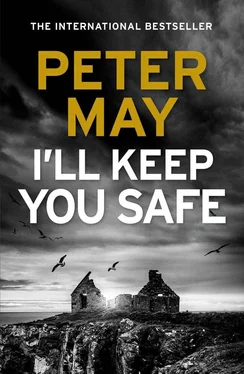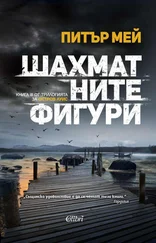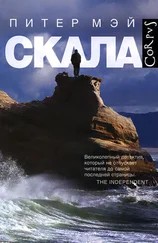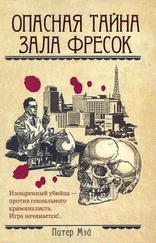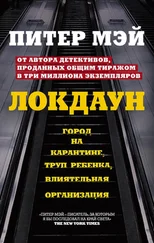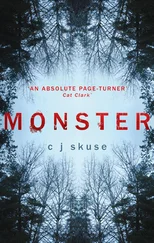My favourite person when I was seven was my grampa. He was my dad’s dad, but I never knew my dad’s mother. She died before I was born. Grampa lived with us in the croft house. Or should I say, we lived with him. It was his house. His croft. Anndra and Uilleam shared a bed, and I slept on the settee in the front room. Grampa had his own room at the back. He had something about him, that old man. He knew stuff. About the world. And about people. He’d spent years at sea and was hard as nails. Even in his seventies. No man in his right mind would pick a fight with him, and yet I never heard him utter a word in anger, or say a bad thing about anyone.
I spent many a long hour sitting with him when he was weaving in the old blackhouse. I’d watch his hands, clasped together in front of him as if in prayer, as he worked the treadles with his feet. Big-knuckled hands spattered brown with age, and veins that stood out on them like ropes. And he would tell me tales of places I had never heard of, with exotic and sometimes daft-sounding names. Hong Kong. Shanghai. Abidjan. Dakar. ‘Never judge a man,’ he used to say to me, ‘by the thickness of his wallet, but by the stoutness of his heart.’ I had no idea what he meant then. But I do now.
My mother doted on that man. More than her own father, and maybe even her own husband. I look back sometimes now and wonder, had she known Grampa as a young man would she rather have married him than my dad?
When family came to stay, which they did quite often in the summer, they would sleep in an old caravan that we kept at the side of the house, lashed down to stop it from blowing away in the south-westerlies.
It was by the side of the caravan that Anndra found Grampa lying on the path one day. The old man had just returned from his daily walk through the village, and his cloth bunnet and his walking stick were lying on the slabs beside him.
Anndra came running into the house. ‘Something’s wrong with Grampa!’ We were just gathering to sit down to dinner and so we all ran out on to the path. Immediately he saw his father, my dad turned and pushed me away. ‘Get back in the house, lassie.’ But it was too late. I’d already caught sight of him. Lying in a strangely unnatural position on the path. It was the first time I had seen a dead person, and although I’m sure he was still warm, his blue eyes were wide and staring at the sky, and it was clear that life had left him. It was his body alright, but it wasn’t my grampa lying there. He was already somewhere else.
The coffin sat in the front porch for two days, and a procession of villagers came to see him lying in it and pay their last respects. Then the minister came and held a brief service in the back room, before the men closed up the coffin and carried it out to the waiting hearse. The days were long gone when they would have carried the coffin down to the slipway at the foot of our croft to sail him across to the island. And Dalmore was much too far to walk. So a hearse it was. But it was only the men who got into their cars to follow it.
‘Are we not going, too?’ I asked my mother.
‘Women don’t go to the grave,’ she said simply.
‘Why?’
‘They just don’t.’ And to my knowledge, she never once went to visit him.
She left me, then, sitting in the front room, gazing out across the bay. It had been a miserable morning, the shadow of death reflected in the clouds that obscured the sun. Suddenly there was a break in the sky out over the bay, and sunlight fell in rings of silver on to the dull pewter of the sea, and with the rain that fell a rainbow arced itself perfectly across the harbour. To this day I like to think that was Grampa saying goodbye.
Even then it struck me as strange that I had not spilled a tear over the passing of the old man. Perhaps I didn’t really understand the finality of death, or maybe it was just some kind of self-protection mechanism kicking in. But that was when I heard a soft sobbing coming from the back of the house, and I tiptoed out of the front room and down the hall. My mother was standing in the open door of my grampa’s room, and beyond her I could see his bunnet and his stick laid out on the bed. It was the first time I had ever seen her cry. It wouldn’t be the last.
That night I slept in his bed for the first time. His room was now mine. When I look back I think about how it might have spooked me to sleep where a dead man had lain. But I derived an odd comfort from it, and somehow felt that he was still and always there, looking out for me.
In my fancy, I might have imagined that it was Grampa doing just that when I nearly drowned a few months later. But, actually, it was Ruairidh who saved me.
It was the end of August, and nearly the whole village was up on the Pentland Road to bring home the peats that had been left to dry out there over the summer.
It is usual for the peats to be cut in the month of May, which is traditionally one of the driest of the year. Although in the Hebrides dry is a relative term. The peat is cut into slabs from a long bank of it, using a special spade or tairsgear , and tossed over on to the bog to dry. Every family has its own peat bank, established sometimes over generations. The deeper it is, and the blacker the peat you cut from the bottom of it, the hotter it burns. It costs nothing, except the blood, sweat and tears you spill to dig it out. This was how islanders had heated their homes for centuries, though these days it is more likely to be oil-fired central heating.
Some weeks after the first cutting you would go back to lift the peats, which had dried on the top side, and build them into tiny stacks. Two or three on the sides and one on the top, to let the air around them. Then before the end of the summer you would harvest the hard dry peats to take them home and build your big stack for the winter.
It had been a wet summer that year, though up on the moor the wind always does a good job of drying the peat. Finally, the clouds had blown off to the east, and there was a break in the weather. It was still and warm. A fine window for fetching the peats. We had one lorry in the village, a sort of communal vehicle that everyone shared, and this was its busiest time of year. Back and forth between Balanish and the peat banks up on the Pentland Road.
The Pentland is a single-track road that follows the contours of the moor all the way across from Stornoway to Carloway. At one point it divides, and a spur of it winds down the hill to Breasclete. It was originally intended as the route of a railway line that was never built, and it got its name from Lord Pentland, the Secretary of State for Scotland, who secured the funding for it. But it’s not a road you would want to take if you were ever in a hurry to get anywhere.
I had rarely witnessed a sky so clear. You could see all the way down to the mountains of Harris in the south, cutting sharp purple contours against the blue. And to the west the Atlantic shimmered off into some impossibly distant horizon, beyond which lay Canada and America many thousands of miles away. But with the wind dropping, the midges were out in force, and so everyone was working hard and fast to get away from the wee biting beasts as fast as they could.
Seonag and I were still too young to be involved in the heavy work, and so we were running around like mad things making a nuisance of ourselves.
The Macfarlane peat bank was on the other side of the road, and Ruairidh’s whole family was out carrying the peats to stack them at the roadside until they could load them on to the lorry when it was their turn. Ruairidh was a couple of years older than me, and although he was in my class — primary one to five — I had barely been aware of his existence. His big brother, Donald, had already gone to Shawbost. And the family lived at the north end of the village, so there wasn’t much contact with us southerners.
Читать дальше
